Hi, we are Alvee, Madawi and Katharina, three students from Leuphana university in Lüneburg.
Alvee is studying International Business Administration and Entrepreneurship, while Madawi and Katharina are enrolled in Environmental and Sustainability Studies. For us, the topic of food waste is close to our heart, and we endeavor to reduce food waste in our daily life. Alvee, who is working in the entertainment industry, takes left over from catering buffets home, Madawi collects all leftovers of the week to make one-pot soups and Katharina frequently collects windfall on orchard meadows to make fruitcake or jam. Madawi was born and raised in Colombo, the capital city of Sri Lanka, and for this blog entry, she reflected about food consumption and behavior patterns in her home country. Katharina calls Lüneburg her second home and shared her observations and experiences about food waste in Lüneburg, while Alvee looked at the bigger picture of food waste and consumption patterns, providing the framing for this blog.
Introduction
Did you know that there are currently around 828 million people around the world who are chronically hungry (WFP 2021)? Shockingly, this number is only increasing, with countries like Afghanistan, Yemen, Somalia, and Niger being the worst affected. But also in other countries hunger is a severe problem. It is a dire situation that demands our immediate attention.
At the same time, it is heartbreaking to know that around 931 million tons of food are wasted every year. That’s right, you read it correctly! A staggering 17% of the food produced worldwide goes to waste. These numbers are taken from HungerMap LIVE, a global initiative by the World Food Programme.

The statistics paint a clear and alarming picture of a world where too much food is wasted while too many people are undernourished.
This alarming image of hunger and food waste motivated us to reflect about consumption and to think about possibilities to reduce food waste. Given the fact that around 931 million tons of food are wasted, indicates that it might not be impossible to feed today’s world population with the present food resources. We wanted to understand these global problems from local perspectives and collect possible solutions by comparing two different cities, one from Western Europe and the other from South Asia. One could argue about the differences in terms of geography, economy, religion, infrastructure, and culture relating to the food supply chain available in different parts of the world to initiate action. Curious how these factors play out, we analyze cities in two different countries (Germany and Sri Lanka).
Lüneburg
Lüneburg is a small Hanseatic city in the German federal state of Lower Saxony. With an area of 70,38 km2, it is home to around 80,000 people (Hansestadt Lüneburg 2023). Lüneburg as a student town, with its narrow streets and old buildings, and a vibrant, young demographic, personifies the intersection of student life and German culture. As a student of “Environmental and Sustainability Sciences” I interact mostly with people who have a high environmental awareness. We all avoid food waste as much as possible and agree that food is a precious resource which should not end up in the trash. Sometimes, friends and I even go dumpster diving. When going dumpster diving, people go to stores after their closing hours and take food from the bins, which couldn’t be sold and got thrown away. In Germany, it is forbidden to rescue food thrown away by supermarkets. Nevertheless, we do it because we are convinced that it is morally right to save edible food from the garbage can. Sometimes, I take this awareness in my friend group for granted and wonder about the astronomical numbers in official statistics. According to the statistics of the German Ministry for nutrition and agriculture, every person in Germany throws away 78 kg of food every year (BMEL 2022). Of course, there is also unavoidable food waste like nutshells, bones, fruit seeds and coffee grounds but around 40% would be theoretically avoidable. How does that come about? Aren’t we all doing our best to consume in a responsible way? Last week I had an experience that showed me that I am apparently living in a green bubble and that awareness of unavoidable food waste is not a matter of course for everyone. I baked a birthday cake for a good friend of mine who is the only one of my friends who I don’t know from my small university bubble. He tried the cake and left half of the piece on his plate because he was full. A few hours later I found the rest of the piece in the garbage. Nothing was wrong with this piece of cake and when I confronted him, he defended himself by telling me that it had become a little dry. I was furious and gave him a lecture, but for me it was a lesson as well. I learned that I cannot assume that everyone acts as responsibly with food as I do. I wondered how it comes that we perceive the value of food differently. My suggestion is that it matters how one is raised. I also realized that your social surrounding can have a huge impact on you. Before my studies I did not throw away food, but I took no initiative to save food either. For me it was a right thing to lecture my friend as I feel like he became aware of his actions having the possibility to reflect.
So, how aware are people about food waste here in Lüneburg, and how do they deal with it? Unfortunately, there are no statistics for the city of Lüneburg to compare data, therefore I will summarize personal observations, and talks I have had with different people and introduce initiatives I have come across throughout the three years I have been living here.
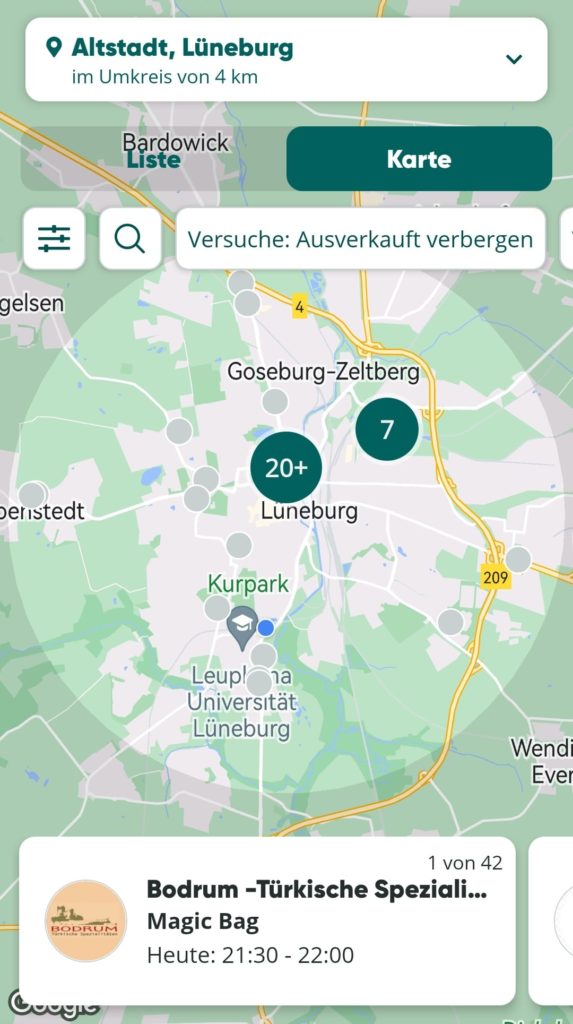
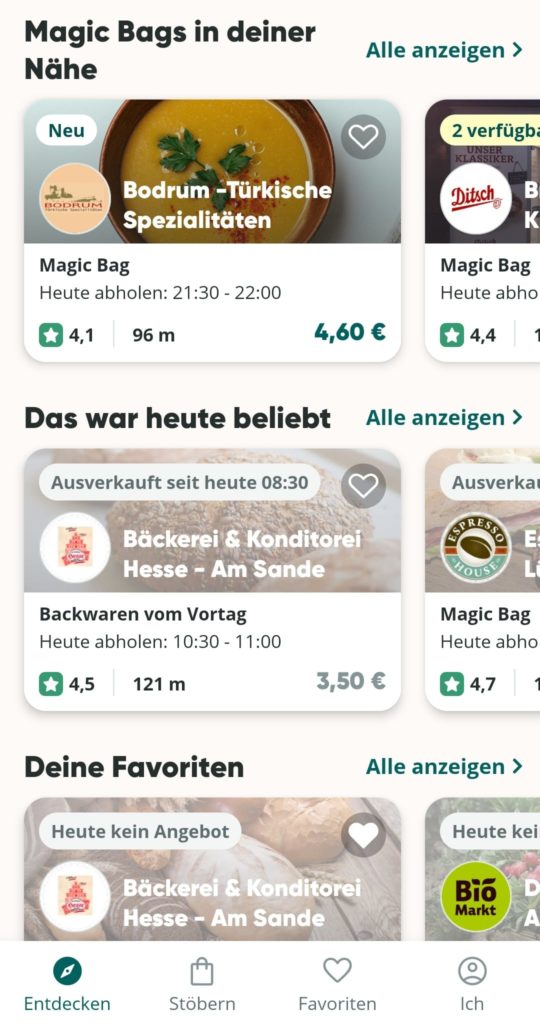
“Too good to go” is an App connecting restaurants and grocery stores that have surplus food. The app allows you to buy the food for a very low price shortly before the store closes. The app is available in 15 countries. In Lüneburg around 30 stores are participating.
Screenshots taken from the “To good to go” app (11.02.2023) by Katharina
Many grocery stores also collaborate with the association “Tafel e.V.”. The Tafel collects surplus food that is still edible according to legal regulations and gives it to people in need. In Lüneburg 19 stores donate their surplus food to the Tafel.
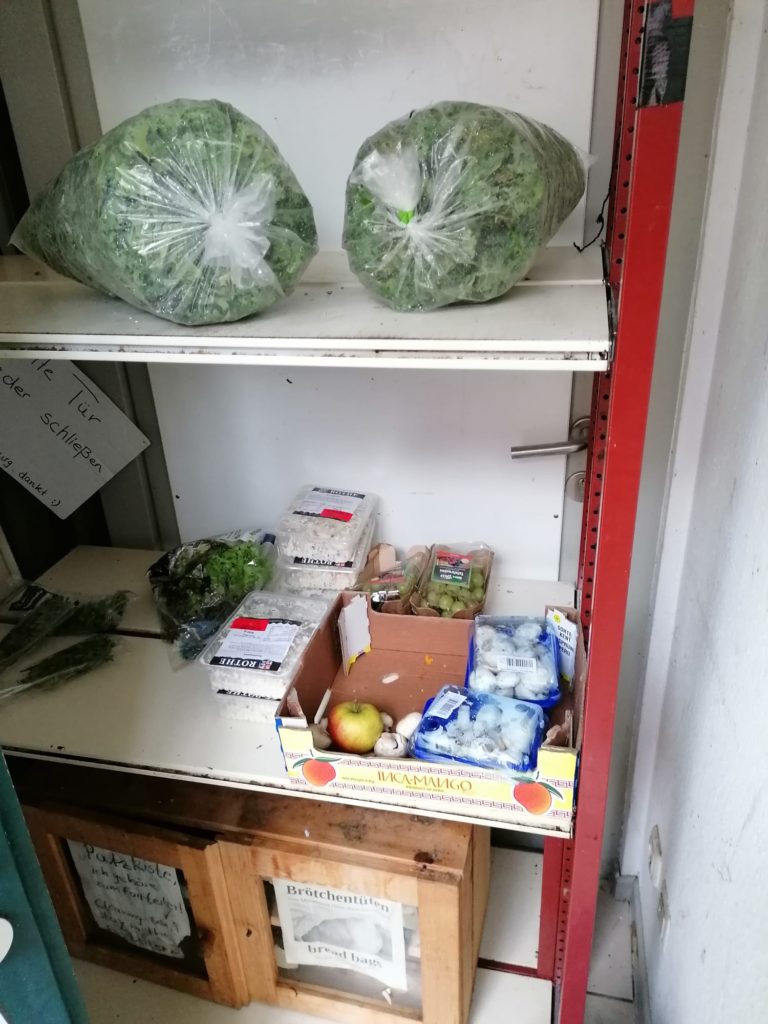
“Food sharing” is another initiative operating in Germany, Switzerland and Austria. Private people form a community in their city where they organize the pick-up of groceries from stores. The surplus food is free and is further distributed to several locations around the city, called “Fairtailer”. In Lüneburg there exist six “Fairteiler”. Here, everybody can bring and take food. Before becoming part of the community one has to register and pass a quiz to ensure that the legal agreement and the rules of conduct were understood.
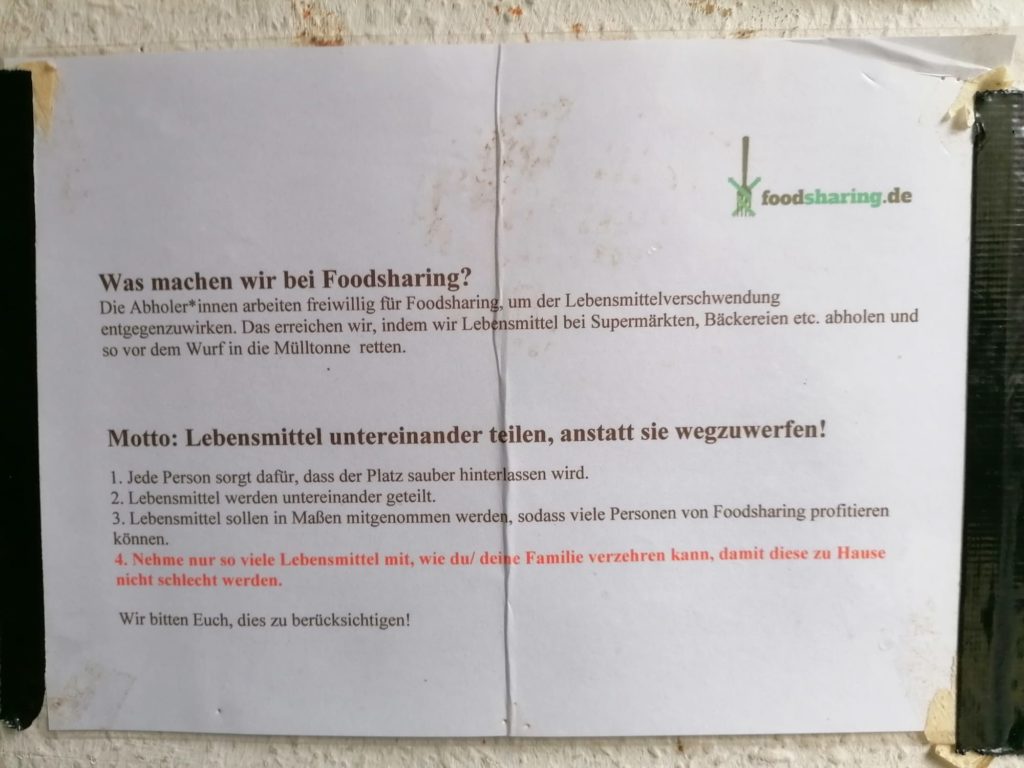
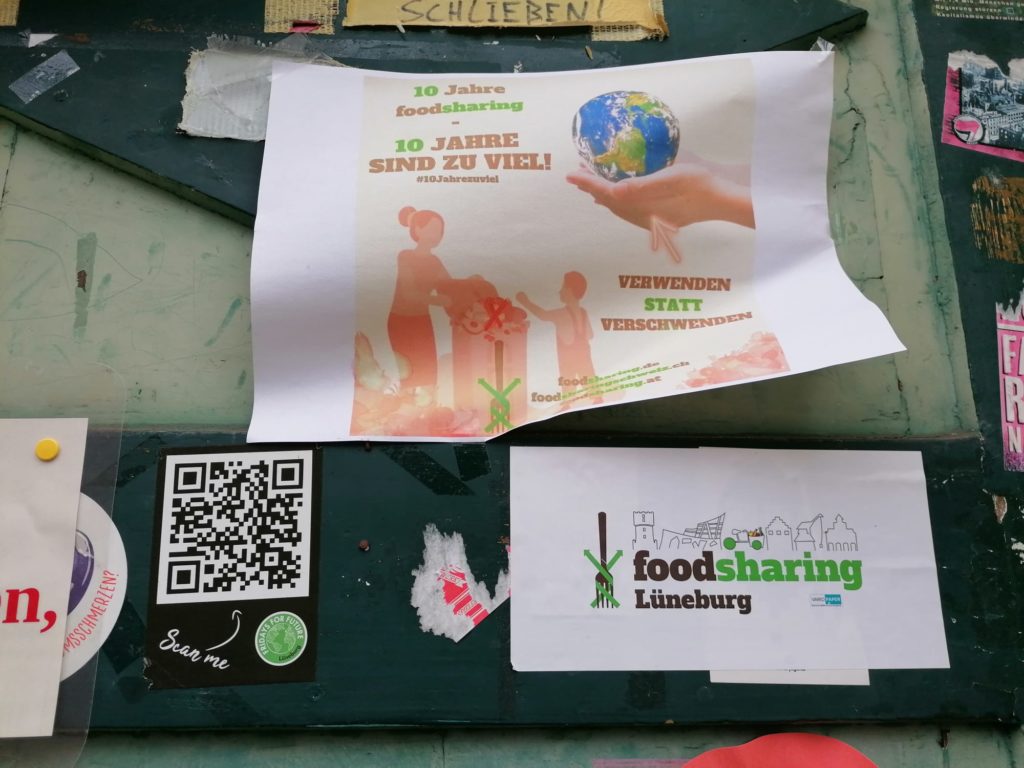
Pictures taken at the Fairteiler Ritterstraße (12.01.2023) by Katharina
Most German supermarkets also try to reduce their amount of food waste by selling products near the expiry date for a reduced price.
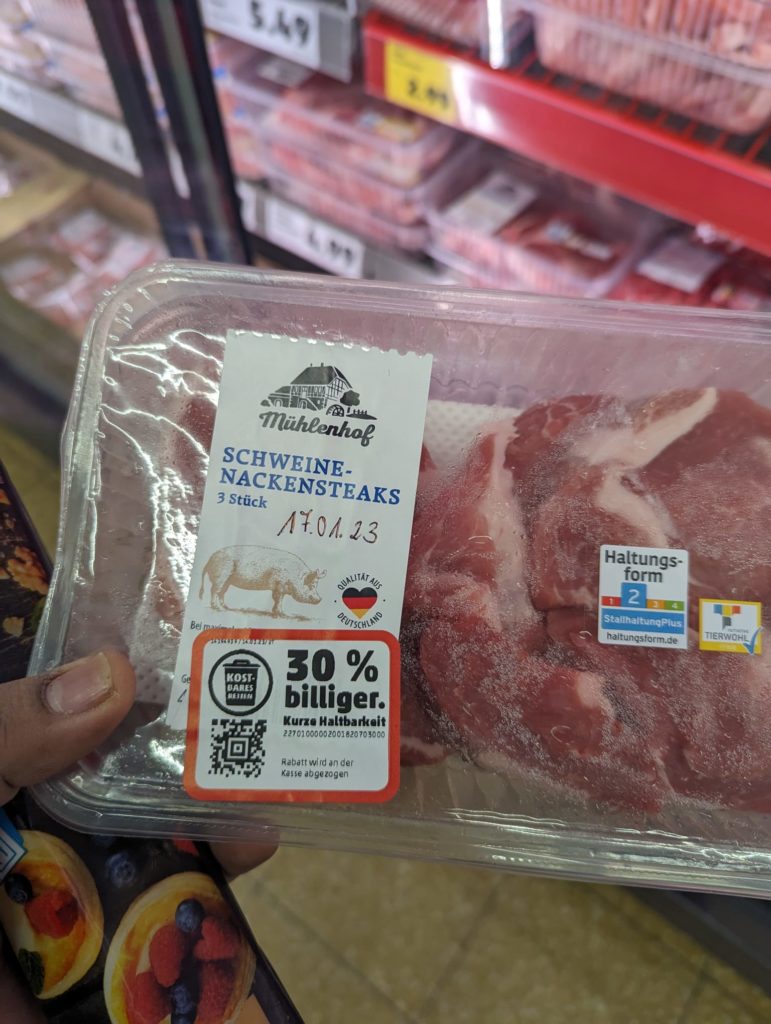
Furthermore, there exist several informal groups on social media apps like telegram called “sharing is caring”. Among other things, surplus food is also offered there.
Most of the food was also rescued either through one of the initiatives presented above or through dumpster diving.
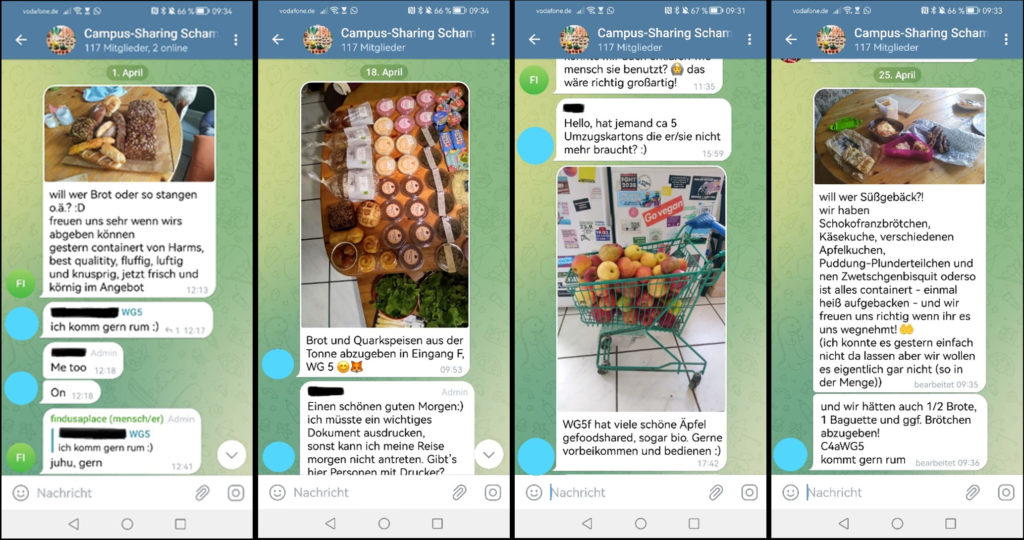
Currently, there are political discussions to legalize dumpster diving in Germany. The German Federal Minister for Food and Agriculture, Cem Özdemir, stated in January 2023 that dumpster diving should be decriminalized.

There are good initiatives in and people who are active in rescuing food from the bin in Lüneburg. While many people are already involved and campaign against food waste, there is another part that still consumes and throws away without thinking. Therefore, the efforts on the individual and political level must continue so that everyone considers their consumption behavior and is encouraged to take action.
Colombo
It has almost been 3 years since I started my studies in Germany. Whenever anyone asks what I miss most about home, one of my answers would be food. Coming from Sri Lanka, a middle-income country, food played a major role in our culture. In my experience food acts as the centre of most social gatherings. As a sustainability student, I often get into discussions about SDGs and recently I discussed the problem which falls under SDG 12 “Responsible consumption and production”. Even though there are so many differences between Lünerburg and Colombo, the city I currently live in and the city I am from, one of the common problems we face is the problem of food wastage. It was surprising to see that a person wastes 76 kg annually in Sri Lanka, which is a middle-income country, and that this was not very far from German statistics. It was very interesting to compare how these very different cities, Lüneburg and Colombo, tackle food waste. Colombo, which is the capital city covers an area of 43.62 Km2 with a highly dense population of 561,314 people. Due to the higher density of the population, most of the residents live in flats/ apartments. If you were to take a tour of Colombo city, you would be able to see anything from high-rise buildings to slums (old deteriorating tenements or subdivided derelict houses) and shanties (improvised and unauthorized shelters) where you can see the wealth distribution gap between the residents of Colombo.
In Colombo we have many supermarkets compared to the rest of the country. Tourist hotels and restaurants are also widely available. There are also open food markets in different parts of the city happening on different days of the week. You can observe a lot of bargaining which makes the atmosphere a little noisy. The food waste in Colombo are generated through supermarkets, restaurants and hotels. Apart from that, waste generated from households amounted to 1.6 million tonnes per year (UN Food Waste Index 2021).

A study entitled “Perceptions of Food Waste Reduction in Colombo”, found through interviews that in smaller or more local entities food waste was only perceived as an end-of-business challenge for the city’s waste collection service (Reitemeier et al., 2021). This shows the lack of responsibility and awareness regarding food waste. One of the golden rules, if you are hosting a gathering in Sri Lanka is that “having excess food is always better than having less food”. It is very common in Sri Lanka that we do not have to confirm our attendance at any gathering we have been invited to. For example, birthday parties and weddings. It is common in these events to have lots of food remaining because people can simply not show up.
To tackle the problem of food waste, the government as a major stakeholder has introduced policies addressing the problem such as the National Waste Management policy (revised 2019), the National policy on sustainable consumption and production (2019), the National agriculture research policy and strategy (2018-2027).The Colombo municipal council (CMC) has also confirmed its commitment to address the food waste problem at the signing of the Milan Urban Food Policy Pact. These are some efforts that the government has taken in to reduce the food waste in Sri Lanka.
The major motivation to save food comes from financial incentives for both businesses and consumers. Due to the higher inflation prevailing in the country, especially food prices have skyrocketed so, therefore, people tend to be more careful with their food. There are initiatives such as Robinhood Army and Soup Bowl involved in food rescue and currently engage in the distribution of food relief from donations due to the economic crisis of the country. Other current attempts to reduce and reuse waste and edible food are, for example, passing it on to food processors, collaborating with food rescue teams and some livestock farmers also collecting the food waste from hotels and restaurants to feed the animals. Introducing different portion size menus at restaurants, making the decisions regarding food wastage a part of the management process rather than after production decisions at restaurants and supermarkets, and active involvement of the government in implementing policies are some solutions to reduce food waste. Creating awareness among consumers regarding food waste and introducing the topic in the curriculum of school children could be methods to have long-term positive impacts on responsible consumption as a whole. Even though actions are missing, creating a gap in tackling the problems of food waste, the existence of initiatives and certain policies can be considered a step towards reducing food waste in the city of Colombo.
Conclusion
It is apparent that food waste is a major problem worldwide and we need to take action to address it urgently. We must continue to analyze and learn from different regions to find effective solutions to tackle the problem of food waste.
Let’s take action to stop food waste! Here are some things we can all do individually:
● Plan meals carefully, make a shopping list, and only buy what we need. Avoid impulse buying and bulk purchases that may end up going to waste.
● Learn how to store food properly to extend its shelf life. Use freezer bags or airtight containers, and label and date everything.
● Get creative with leftovers and turn them into new dishes. Soups, stews, and casseroles are great for using up leftover vegetables and meats.
● Instead of throwing away food scraps, compost them. Composting reduces methane emissions from landfills and produces nutrient-rich soil for gardening.
● Many organizations are working to recover surplus food and distribute it to those in need. Support them by volunteering, donating, or spreading the word about their work.
Group Members – Katharina, Alvee and Madawi




